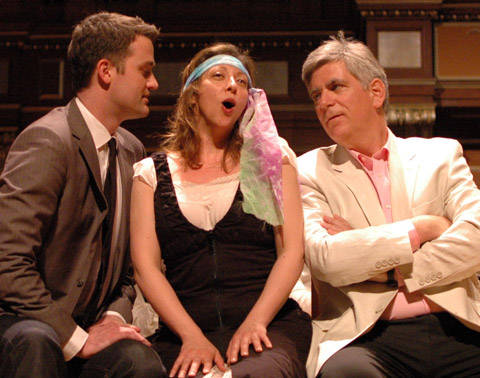
KEEP YOUR SEATS! Aaron Sheehan, Nathalie Paulin, and Nathaniel Watson were not required to dance in Boston Baroque’s exciting performance of Rameau’s Les Indes galantes. |
As the season wound down, one of the most applauded concerts was Boston Baroque’s semi-staged version of Jean-Philippe Rameau’s early 18th-century extravaganza, the “opéra-ballet” Les Indes galantes (roughly, “The Romantic Indies”). Rameau, of course, didn’t really know what “Indies” were, and so his four episodes, clearly designed for elaborate stage effects, take place in Turkey, Peru, Persia, and among the “sauvages” of America. In the repetitive plot lines of the libretto, each episode is a love triangle, with only the Peruvian section ending unhappily (the rejected lover throws himself into a volcano).
Boston Baroque maestro Martin Pearlman impressively re-assembled and made legible, as the program indicated, the individual orchestral parts for the score used by William Christie’s Les Arts Florissant, the world’s pre-eminent and most elegant producer of Baroque music-theater. Pearlman followed in Christie’s footsteps by having the staging (even the chorus) in contemporary dress (here casual rather than formal), with director Sam Helfrich once again resorting to inevitable shticks with cell phones, etc., yet allowing, even encouraging, the superb singers to respond to the score.
The dance element was more problematic. With the orchestra, chorus, and singers all on the small Jordan Hall stage, the five dancers, including choreographer (and former Mark Morris dancer) Marjorie Folkman, didn’t have a lot of space, and so the lithe and lively dances, some of them freshly callisthenic, never had quite enough room to blossom. By the very end of the long evening, Rameau’s lengthy series of non-stop dances, so inventive musically, seemed less inventive choreographically. In these circumstances, it might have been better not have a dance for every single piece of dance music.
I thought Canadian mezzo-soprano Nathalie Paulin stole every scene she was in with her warm, coppery (or was it topaz) timbre, expressive phrasing, and natural French diction. But fresh-voice soprano Amanda Forsythe, tenor Aaron Sheehan, and witty countertenor Daniel Auchincloss weren’t far behind, though the two lowest voices, baritones Sumner Thompson and Nathaniel Watson, seemed less comfortable or spontaneous. The greatest music is a sublime quartet in the Persia section, which I know best from the Christie recording, and my highest praise for this performance is that I thought the pacing and shaping of Pearlman’s quartet was even more ravishing.
Rarer still was Opera Boston’s production of Donizetti’s Maria Pedilla, a bel canto opera based on actual historical characters. Maria Pedilla was, for political purposes, the secret wife of Spain’s Pedro the Cruel, but everyone (except Maria’s father) functioned more easily under the assumption that she was his mistress. Unusual in opera, the lover, Pedro, is sung by a baritone, and the mad scene goes not to the soprano, Maria, but to her father, the tenor. The plot, even with supertitles and Richard Dyer’s helpful program notes, remains obscure and hard to follow. Donizetti himself kept changing the ending. At the premiere, Maria died of grief. In a later version, she dies of happiness. At Opera Boston, she didn’t die at all. None of these is truly satisfying.